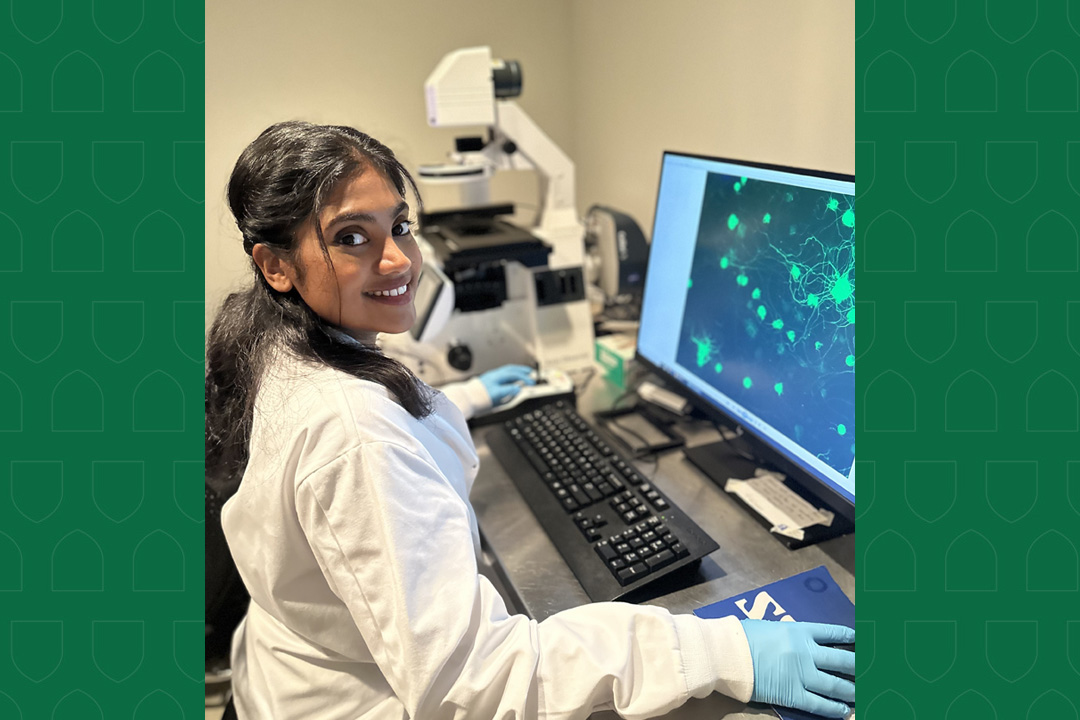
Exploring cellular therapies for peripheral nerve repair
Bhadrapriya Sivakumar is a graduate student in Dr. Anand Krishnan’s (PhD) lab in the Department of Anatomy, Physiology and Pharmacology at the College of Medicine.
Sivakumar earned her bachelor’s and master’s degrees in India before joining Krishnan’s lab to pursue her PhD.
After investigating the Krishnan Lab and finding the research aligned with her interests, Sivakumar applied and was accepted into the University of Saskatchewan (USask) PhD program in 2022. Since then, her research has focused on developing cellular therapies to treat peripheral nerve injuries, which affect areas such as the arms and legs.
Sivakumar’s work centres on a protein called mesencephalic astrocyte-derived neurotrophic factor (MANF) that helps protect and repair nerve cells. MANF has mostly been studied in neurological disorders like stroke and Alzheimer’s disease, but its potential hasn’t been as widely studied in peripheral nerve areas.
Sivakumar is investigating how MANF might help heal damaged nerves in the peripheral areas. Earlier this summer, she was the lead author on a publication from the Krishnan lab that was published in Cell Regeneration.
To support her work, Sivakumar received a CoMGRAD award in 2023, which provides two years of funding for College of Medicine graduate students with a passion for research. (In 2025, the CoMGRAD Award was updated to three years of funding).
Sivakumar was also recently honoured with the 2025 Trainee Professional Development Award from the Society for Neuroscience (SFN), an international recognition awarded to students who demonstrate scientific merit and excellence in research. As part of this award, she will attend the society’s annual meeting this fall in San Diego to present her work.
We asked Sivakumar a few questions to learn more about her studies, research interests and what a typical day looks like for a graduate student.
Can you share a brief overview of your academic background. What degrees did you earn before starting this program?
I hold a Bachelor of Science degree with a triple major in chemistry, botany, and zoology from CHRIST University, India, which I completed in 2020. I then pursued a master’s degree in biotechnology at CHRIST University, where I graduated in the top two percentile of my class and was honoured with the Meritorious Student Award in recognition of my academic excellence. As part of my master’s program, I completed my thesis at the Rajiv Gandhi Centre for Biotechnology, where I worked on a gene knockdown related to Amyotrophic Lateral Sclerosis (ALS).
Could you tell me about your area of research and what inspired you to explore it?
Prior to coming to USask, I had the opportunity to work on ALS — a progressive motor neuron disease that highlighted the impact of physical disability. That experience motivated me to pursue research aimed at restoring function and improving the quality of life for individuals affected by nerve damage.
Broadly speaking, my research at the Krishnan Lab focuses on peripheral nerve injuries. Despite how common they are, there are currently no effective clinical therapies that enable complete nerve regeneration and restore functionality. My research investigates the use of MANF — to develop a clinically viable cellular therapy aimed at promoting nerve regeneration.
Congratulations on your recent paper! What excites you most about this research?
Thank you! What excites me about this research is the thought that I am able to make a small contribution that could potentially one day help patients with nerve injuries. The problem is complex, but every drop contributes to the ocean. Additionally, having the opportunity to design protocols and standardize experiments from scratch helps me innovate, troubleshoot and grow as a critical thinker.
What does a typical day look like for you as a graduate student?
I typically start my day around 7 am and arrive at the lab by 9 am. I begin by meeting with my mentees to review their previous experiments and help plan their next steps. I then focus on my experimental work, followed by data analysis and planning upcoming studies. I also ensure to spend time every day to read and stay updated.
Once a week, I meet with my supervisor to discuss progress and receive feedback. As a senior PhD student in the lab, I actively participate in supervisor meetings and serve on the lab's safety committee to help maintain a collaborative, well-managed and safe research environment. I usually wrap up around 5:30 pm and unwind with the gym, cooking or catching up with friends.
What advice would you give to someone considering a graduate or PhD program? Is there anything you wish you knew before you started?
My advice to anyone considering a PhD program is to truly understand what you're signing up for. A PhD is a long-term commitment that requires resilience, self-motivation and the ability to navigate uncertainty. Go in with the right mindset and a clear sense of purpose, so the years you invest are meaningful and productive.
It’s important to set realistic goals, stay organized, and seek out mentorship. Prioritize a healthy work-life balance — burnout is real, and maintaining your well-being will help you stay focused and motivated. I wish I knew early on to not let setbacks affect my self-worth and that beyond intelligence, it’s the hard work, consistency and resilience that drives results.
